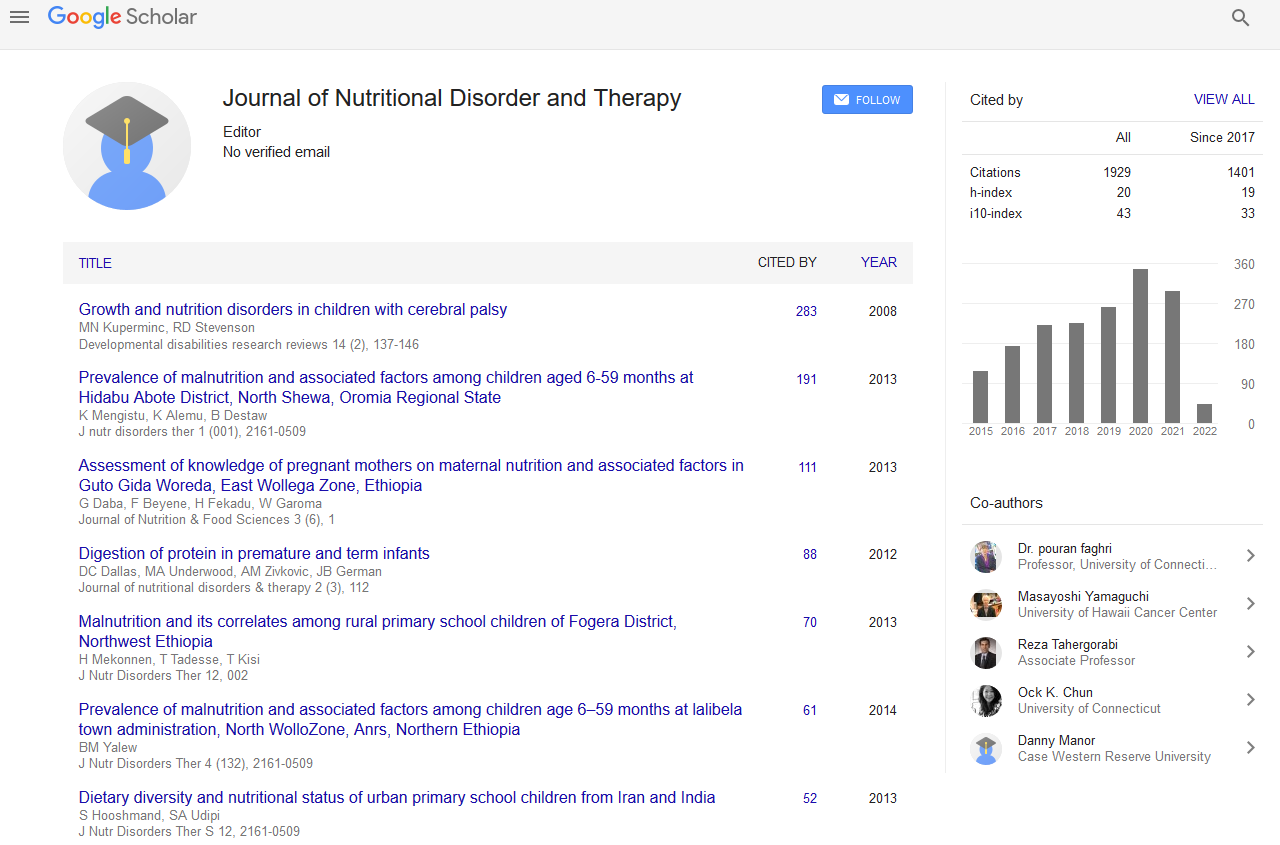Indexed In
- Open J Gate
- Genamics JournalSeek
- Academic Keys
- JournalTOCs
- Ulrich's Periodicals Directory
- RefSeek
- Hamdard University
- EBSCO A-Z
- OCLC- WorldCat
- Publons
- Geneva Foundation for Medical Education and Research
- Euro Pub
Useful Links
Share This Page
Journal Flyer

Open Access Journals
- Agri and Aquaculture
- Biochemistry
- Bioinformatics & Systems Biology
- Business & Management
- Chemistry
- Clinical Sciences
- Engineering
- Food & Nutrition
- General Science
- Genetics & Molecular Biology
- Immunology & Microbiology
- Medical Sciences
- Neuroscience & Psychology
- Nursing & Health Care
- Pharmaceutical Sciences
The relationship between vitamin D status and metabolic syndrome: A cross-sectional study among employees at a university in Lebanon
15th International Conference on Clinical Nutrition
May 24-26, 2018 | Vienna, Austria
Jocelyne Boumosleh, Rachelle Ghadieh, Sybelle el Hayek and Jessy el Hayek
Notre Dame University-Louaize, Lebanon
Scientific Tracks Abstracts: J Nutr Disorders Ther
Abstract:
A total of 344 employees at Notre Dame University, Lebanon completed three questionnaires: food frequency questionnaire, background questionnaire (socio-demographic & lifestyle factors), and international physical activity questionnaire �?? short form. Serum 25(OH)D level was measured using the Calbiotech 25(OHD) enzyme-linked immunosorbent assay Kit (Spring Valley, California, USA). Vitamin D status was determined based on the National Osteoporosis Foundation (suboptimal vs. optimal: serum 25(OH)D level < vs. �?� 75 nmol/L /< vs. �?�30 ng/mL) and the Institute of Medicine (inadequacy or adequacy: 25(OH)D < or �?�50 nmol/L /< or �?�20 ng/mL) guidelines. The National Cholesterol Education Program Adult Treatment Panel III criteria for the Metabolic Syndrome ( MetS) were used to identify individuals with MetS and any of its components. The data were analyzed using the SPSS version 22 for Windows. A p-value <0.05 was considered to be statistically significant. The prevalence rate of MetS was found to be 23.5%. Among MetS components, central obesity was the most prevalent condition (50.6%), followed by hypertriglyceridemia (32.6%), low HDL levels (23.8%), high blood pressure (21.2%) and last by impaired fasting blood glucose (20.3%). Using the National Osteoporosis Foundation and Institute of Medicine guidelines respectively, the odds of having MetS were found to be 2.5 to 3 times higher among those with suboptimal or inadequate vitamin D status than those with optimal or adequate vitamin D status, after adjustment for confounders. Study findings can be used to spread awareness about the potential role of optimal/adequate vitamin D status in preventing development of MetS.
Biography :
Jocelyne Boumosleh earned her PhD in Epidemiology and Biostatistics from University of Pittsburgh, USA, in 2006, completed her Post-doctoral training at University of Texas Southwestern Medical Center in Dallas, USA, in 2010 and joined the Faculty of Nursing & Health Sciences at Notre Dame Univeristy (NDU), Lebanon since then. She has been teaching courses in Health Sciences, Epidemiology, Biostatistics and Research Methods. Her areas of research interests include, nutrition and mental health, body composition/fat distribution and metabolic abnormalities, nutrition and body composition/fat distribution, addictive behaviors among adolescents (determinants and effects on health outcomes), non-communicable diseases particularly, PCOS, cardiovascular diseases and breast cancer.
Email:jboumosleh@ndu.edu.lb


